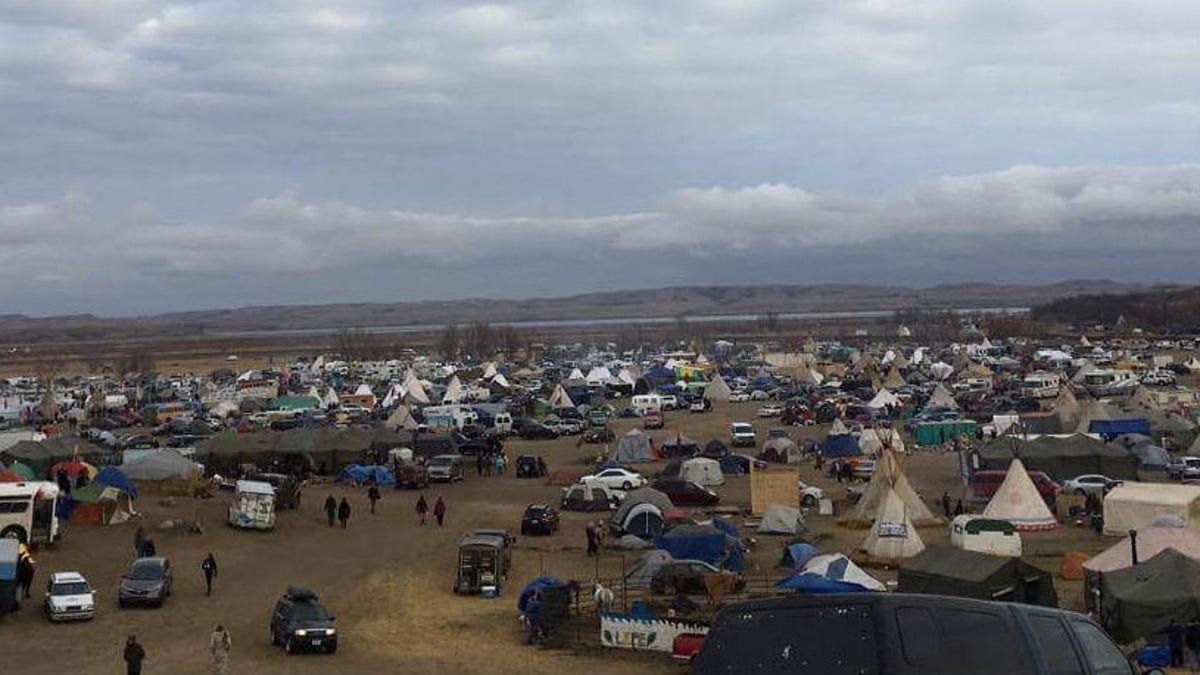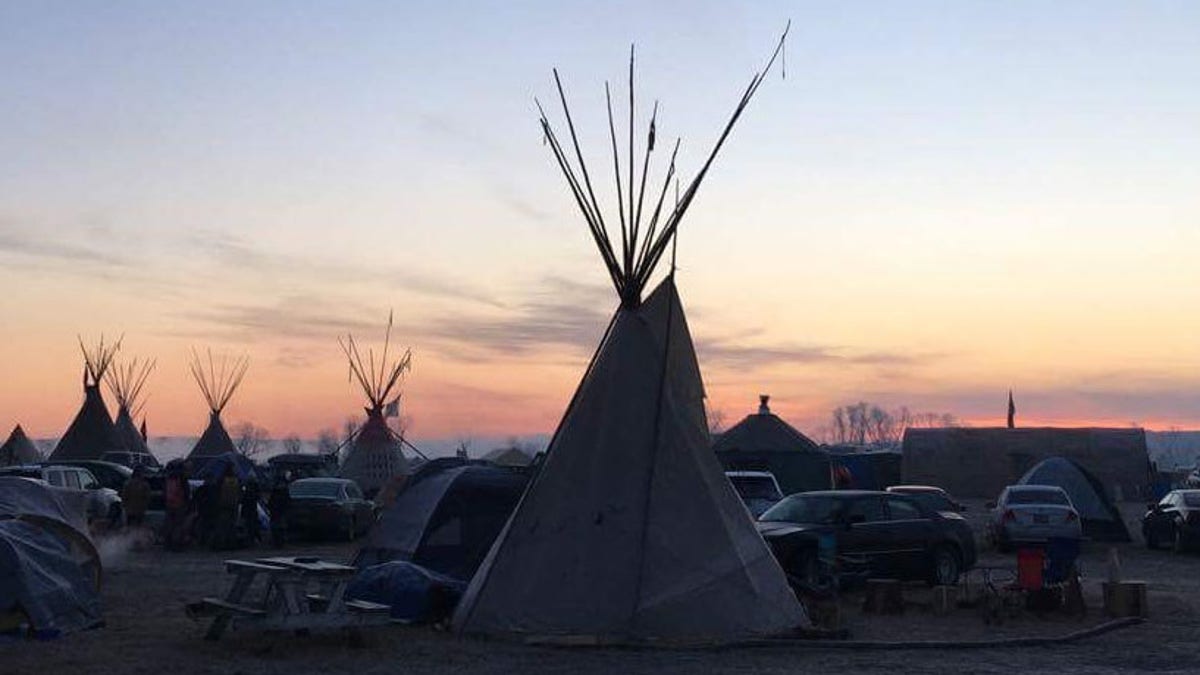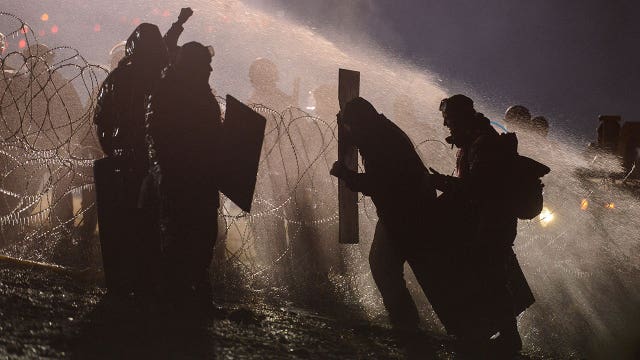Veterans to stand with Standing Rock protesters
Hundreds of veterans of the US Military are deploying to the Standing Rock Indian Reservation in North Dakota, joining protests against construction of the Dakota Access Pipeline
Pipeline protesters in North Dakota are either too afraid their hard fought victory will slip away or are having too much of an experience to disperse, and it may take plunging temperatures and disease to dislodge them from their camp at Standing Rock.
Drumming, sacred blessings and cries of joy have echoed from the assembled throng of Sioux Indians, environmentalists, civil rights and water-worried protesters after the weekend announcement that U.S. Army Corps of Engineers struck down plans for the controversial Dakota Access pipeline.

Thousands remain encamped despite bitter cold and deteriorating conditions. (Special to FoxNews.com)
The tube, which is nearly complete, was to extend under a section of the Missouri River that the Standing Rock Sioux consider sacred ground, even though it is not on their reservation. With temperatures diving, and the lack of sanitation taking its toll, it may seem there’s nothing left to fight – or celebrate. But even though some of the less hardy have gone their separate ways, tribal elders vowed this week that it is an “absolute” they will remain.
“The greater fight is the corporations raping the earth,” Margaret Engle Reyes, an activist who traveled to the camp last week, told FoxNews.com. “That is the real fight and will continue. People here are used to bad snow conditions and are hunkered down. Some of the California hippie types might not stay.”
Protesters fear the victory – which comes in the twilight days of the Obama administration – is fragile. President-elect Donald Trump has the power to overturn the decision when he takes office next month, and has vowed to make energy independence a top priority.

Shelter is scarce, and some of the locals resent outsiders, sources said. (Special to FoxNews.com)
The $3.8 billion, 1,170-mile natural gas pipeline proposed and mostly completed by Energy Transfer Partners is slated to carry around 470,000 barrels of domestic crude oil per day from North Dakota to Illinois. The company claims it will be far safer and more cost effective than moving oil by rail, and officials emphasize that the project is not on reservation, but rather privately-owned land.
James Reese, founder of private security firm Tiger Swan, which was hired by Energy Transfer to protect private property in early September, told FoxNews.com that law enforcement has any potential flare-ups “under control,” and that his battery of personnel – made up mostly of Special Operations veterans – will “continue to sit and make sure the equipment and private property is safe.”
He is betting that his men can outlast at least most of the protesters.
“Our assessment is that many will leave,” Reese continued. “But there will still be a hardcore element that will stay on and protest.”
A spokesperson for the Tribal Council at Standing Rock did not respond to a request for comment. At the sprawling camp, where thousands remain, there are growing concerns over health and safety. Undercover officers patrolling the camps cited overflowing toilets, bad cases of diarrhea and the spread of bronchial problems.
“Demonstrators are having issues with pink eye, strep and pneumonias,” another source on the ground said. “They aren’t showering for five or six days, many are sharing beds. It’s going to happen.”
Several sources cited increasing friction among the demonstrators, telling FoxNews.com that this week there has been quarrelling over supplies, huts being taken over by non-locals and a rift among leadership over whether the outside supporters are even welcome. One protester said the donations from around the nation have dried up, the vets who came have abandoned their leadership and there is a genuine fear people will die.
“There is some discontent between factions in the camps, and the weather is brutal,” Reese said. “People are trying to sleep in cars, and carbon monoxide poisoning is a concern. There are over 100 vehicles in snow banks crashed on the side of the road. People are trying to leave but don’t know where to go. Visibility is about 50 feet. If you aren’t ready for this environment, you will die.”
Rob Keller, spokesman for the Morton County Sheriff’s Department, said that they have opened up a community center and schools in the area for demonstrators to seek shelter, and highlighted that the weather has made this a “life or death situation.” Keller noted that there was little logic or reason for people to remain in the camps, but said they would not forcibly remove people. Yet many demonstrators insisted that the bigger fight remains as firm as ever, claiming that the construction is only temporarily halted, and that the drilling will go on.
“This fight will end when we see the end of the outdated fossil fuel era, when this greed and destruction has been replaced by the sanity of sustainable systems that honor our earth and its people,” stressed activist Nicole Fantl.
If the elements, supplies and health risks weren’t enough, there is always the danger violence could break out between law enforcement and demonstrators.
“You can still do security and you can be nice. But when they start throwing stones and rolling propane bombs at you, it is not being nice anymore,” Reese said. “We are outnumbered thousands to one. The law enforcement is outnumbered hundreds to one. It is a small law enforcement [presence] here and they are tapped out, these protesters are taking away other officers from their community. The locals are tired, their livestock is missing. This has been going on for months.”
Law enforcement has characterized the protest as lawless, and more than 400 have been arrested. While most of the protesting is taking place in North Dakota, security and intelligence personnel did span South Dakota, Iowa and Illinois over steep concerns that the situation will spill over.
Several sources also told FoxNews.com that protesters threatened the lives of employees and other figures connected to Energy Transfer Partners in Texas, which in recent weeks became a point of great concern for them and their families, some of who consulted private guard firms.
However, protesters have vehemently denied unlawful behavior and paint a very different picture.
“It is a peaceful prayer camp and people adhere to and respect that. The people are respectful, conscious, educated and socially aware. The water protectors are not doing anything to warrant the violence against them,” protester and filmmaker Elias Matar, 52, said, before hinting that some were concerned their electronic devices were hacked and tapped. “There have been frequent incidents of phones displaying strange behavior.”
Jamie Brennan contributed to this report










































